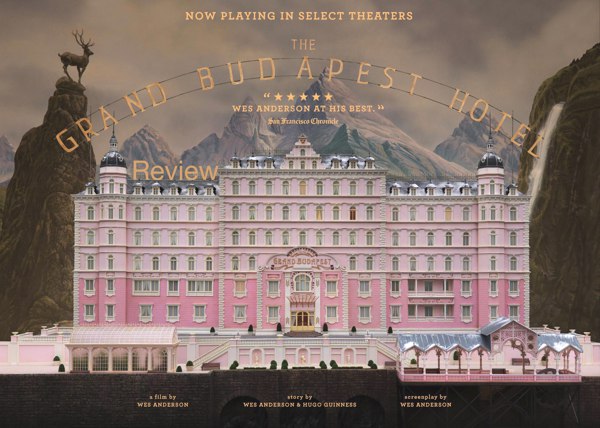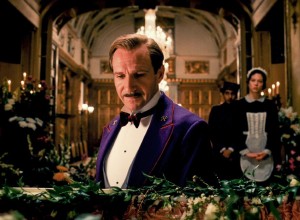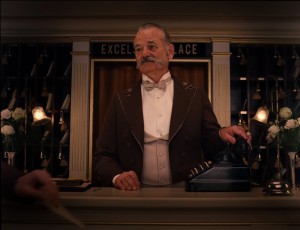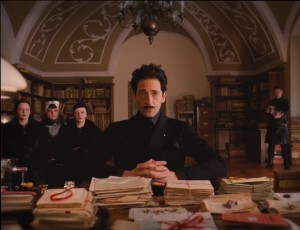
Wes Anderson is one of my favorite directors. Rushmore struck me as mean spirited but fascinating the first time I saw it, and upon second viewing I connected with the story of boy who wants to be a man and a man who wants to be a boy again. It may be mean but there is a rich story about growing up in the craziness of life. When I saw The Royal Tenenbaums, I turned to my friend Corey and said “every time we ever plan to see a movie this year, let’s watch this again instead. Because nothing will be better.” The humor about family dynamics is infused with a true pain that cuts through with the awkwardness of what life throws at us. When Moonrise Kingdom was done, I considered Bruce Willis a genius actor and bought the movie for my mother who I knew would appreciate the depiction of love and the difficulty of parenting in that way only Wes Anderson can make seem like a pop-up story book. The artificial and the real meet head on in his films. The Darjeeling Limited is everything I want in a movie. That horrible mixture of anger and humor and love that feels so unnatural and yet believable while telling the story of three brothers learning to bond again. And even the more maligned and less meaningful The Life Acquatic with Steve Zissou worked well for me upon second viewing.
I am a fan.
So it is with great sorrow that I tell you The Grand Budapest Hotel did not do it for me. It has all the visual flair and wild inventiveness of Wes Anderson at the top of his form. From the silly visuals of the mountain side toy elevator which reminded me of the yodeling mountain climber game on The Price is Right, to the incredible locations used for the hotel and prison. And Ralph Fiennes is a revelation as M. Gustave, the one man in charge of everything at the eponymous hotel of the film. He depicts steely-eyed properness and human caring all at once. But beyond Gustave, what this movie lacked for me was heart. What it was full of was artifice: cutesy devices, visual panache, cameo overload.
I’m not a fan of flashback story telling in general but The Grand Budapest Hotel takes it to new extremes. Opening with a girl placing a key upon a grave site of an author, we flash back to the author in his later years describing his past, to which we flash back to the author as a young man who meets the owner of the hotel. Over dinner the hotel owner tells the story of how he came to own it. So it’s yet another flash back. That’s three embedded flashbacks in one story. And it all just smacks of a director who feels a little too full of himself at the moment. Because for the life of me I don’t know why it had to be told that way or even what it brings to the table that’s so useful.
Grand Budapest is in essence an adventure film. It’s the telling of M. Gustave, who befriends the young lobby boy, Zero Moustafa. Taking him into his confidence, they become embroiled in a murder scandal of one of Gustave’s most loyal guests Madame D. In attending the funeral it is learned that M. Gustave has been bequeathed a painting of extreme value and Madame D’s evil son wishes to own everything and is willing to keep on murdering to get everything. The adventure has Gustave stealing property, running from the law, landing in prison, breaking out of prison, escaping from murderers, managing a hotel. Zero does all that in unison, just substitute landing in prison for falling in love with a girl. And all of this is told during the backdrop of a war torn fictitious country. And yet the bond between them never really worked. And certainly nobody else was likable. Why? Well, in large part because we spend so much time being wowed by the intricacies of the plot. The crazy inventions and camera tricks. The cutesy set pieces and people with unique affectations. Not enough attention is given to us wanting to care. Watching a zippy murderous chase scene down a ski slope that looked like a child’s imagination come to life, I was all focused on how Anderson did the camera work. Not who would survive the chase.
I feel like explaining more plot is a disservice because this movie is only plot. Well, plot and cameos.
And this is where I feel it falls apart even more. Just take a look at the poster and realize Wes Anderson has basically put everyone who’s ever worked with him into this film. The poster shows like 25 famous people on it. Bill Murray has a nice 30 second role. Owen Wilson gets 65 seconds. Bob Balaban gets 28 seconds. Harvey Keitel has a larger role at about 5 min. Then you hit 10 minutes with Jason Schwartzman and Jeff Goldblum. I’m just making up numbers. Ultimately I began to realize that Anderson was highlighting the entrance of every actor we would recognize. It’s not as important who Bill Murray was playing as it was that… Bill Murray! Did you see that? Bill Murray!
I like every single person in the film. I like how the film looks. I like how the film is acted. I like the moments of wickedly dry humor. I like the unexpected violence. But I just could not shake the fact that this movie feels like it’s about Wes Anderson and his big brain and famous friends, and not the story, not the characters, and not the audience. By the time it was over, when the big reveal of why this young lobby boy kept the hotel in the face of everything else… when F. Murray Abraham was telling Jude Law the key to the adventure, I missed the answer. I was thinking about other things.
Hopefully in the future, I’ll re-watch this and enjoy myself like when I re-watched The Life Aquatic. But today is not that day.
I am shocked to learn The Grand Budapest Hotel is only 100 minutes long. It felt like 120. And I feel like a hipocrite.




